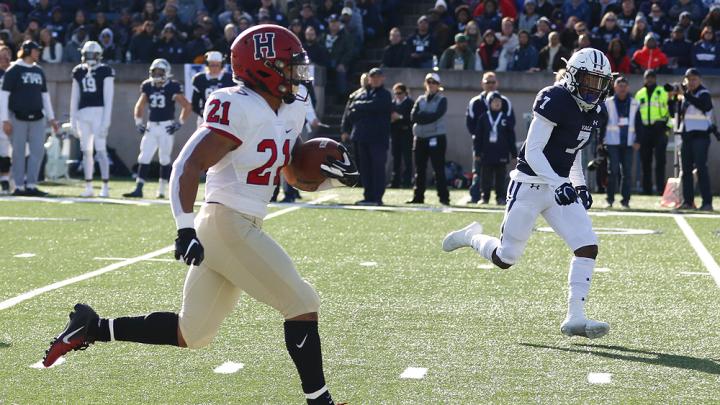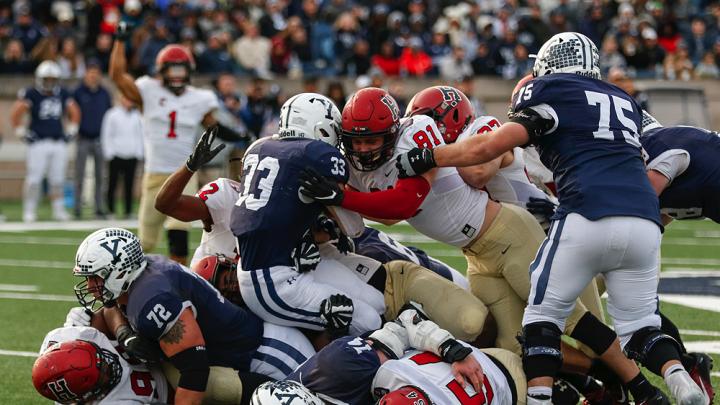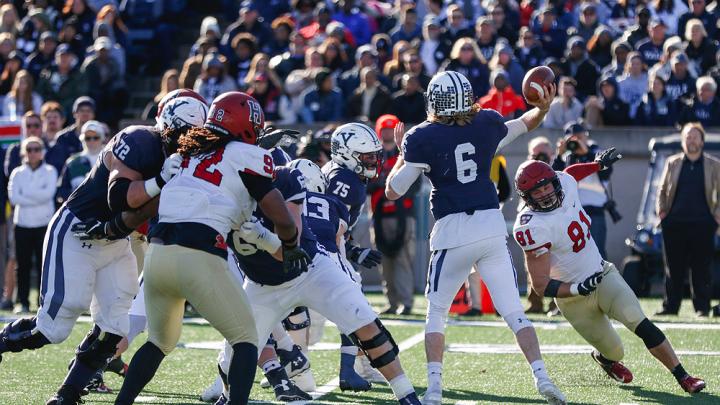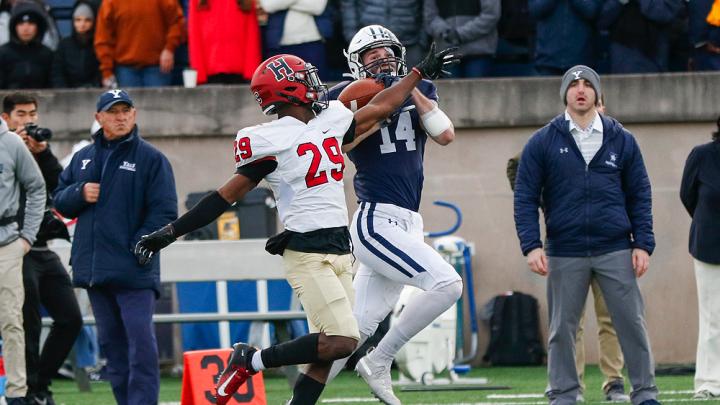For Yale, this one makes up for ’68.
Saturday’s Harvard-Yale game at the Yale Bowl was an instant classic, so spectacular and epic from start to finish that it even overshadowed—arguably—an onfield halftime protest that delayed the action for the better part of an hour. Certainly the contest is in the discussion for the greatest of the 136 Games played. When it was over, in the gloaming of a second overtime, the doughty Bulldogs had emerged with a 50-43 victory.
 Harvard Football
Harvard Football
Sign up for Harvard Magazine’s football e-mail and follow the Crimson’s 2020 season from the beginning! Dick Friedman will provide the latest news, game summaries, and insights. And don’t miss his season summary in the January-February issue, online in December!
The defeat was the Crimson’s fifth straight, all ghastly. Harvard finished the season with a 4-6 mark overall and 2-5 in the Ivy League, putting the Crimson in a tie for sixth place with Columbia. (See Final Standings, below.) This was Harvard’s first losing season since 1998. The victory brought Yale to 6-1 in Ivy League play, 9-1 overall and a share of the Ivy title with Dartmouth.
For the Crimson, it was another Saturday of shoulda, coulda, woulda. Harvard held leads of 15-3, 29-13 and 36-19. With 4:11 remaining it was 36-22 and Yale was on its four-yard line. Still Harvard lost. The defeat negated a Red Grange-like performance by Aidan Borguet. On 11 carries, the Crimson freshman running back romped for 269 yards (an all-time record for The Game) and four touchdowns—tying a Harvard-Yale record—of 47, 59, 60, and 67 yards.
“Stating the obvious, the cruel ending is just so symbolic of the last half of our season,” said Harvard coach Tim Murphy, whose record against Yale is now 18-8. “You keep thinking the law of averages is somehow going to work itself out. End of the day, great effort by Yale.”
On a brisk and sunny day, Yale’s high-powered offense broke on top. Quarterback Kurt Rawlings led the Elis from their own seven to the Harvard four. But the Crimson’s top quarterback harrier, senior defensive lineman Brogan McPartland, sacked Rawlings for a 16-yard loss. Yale settled for a 34-yard field goal by Sam Tuckerman. Yale 3, Harvard 0.
The Crimson got those points back in a hurry. Junior quarterback Jake Smith hooked up with junior wideout James Batch (playing for injured senior Jack Cook) on a 60-yard pass play to the Yale 15. The Crimson drive stalled, so senior Jake McIntyre kicked a 28-yard field goal. Harvard 3, Yale 3.
The next score didn’t come until the second quarter. Crimson junior defensive back Isaiah Wingfield sparked it when he made a sensational diving interception at the Yale 27. Two plays later, Smith flipped to junior wideout B.J. Watson on a bubble screen to the right. Watson dashed all the way into the end zone. But McIntyre’s extra-point try was blocked. (An instance of the Crimson, the nation’s top kick-blocking team, being hoist on its own petard.) Harvard 9, Yale 3.
Then it was time to unleash Borguet. He had been solid all season, but there was little indication that he would run rampant. With a little under two minutes left in the half, at the Yale 47, he took a handoff from Smith and ran to the right through a huge hole created by the Harvard offensive line, all the way into the end zone. This time Harvard tried to get that extra point back by attempting a two-point conversion, but it failed. At the half it was Harvard 15, Yale 3.
Halftime was a game in itself. After the two bands performed, a group of students emerged from the stands and sat down around midfield. Some held signs reading “Yale and Harvard United for Climate Justice.” They were protesting inaction on climate change, specifically demanding that both schools divest their holdings in fossil-fuel investments. As the minutes ticked by, more students—from both schools—came down from the stands. Several dozen police officers kept wary watch. Eventually the protesters left the field. Some 30 were arrested. [[Update as of 11/25/19: The New Haven police listed 50 arrests.]] The game had been delayed by about 30 minutes past the prescribed second-half starting time.
This being 2019, the protest quickly went viral. These being Harvard and Yale, where you stand on this delay depends on a lot of things. First of all, how did Yale Bowl security let this happen? The protesters probably didn’t worry that the players’ and coaches’ routines were disrupted. There were other practical considerations. As things turned out, given the length of the game and Yale Bowl’s lack of lights, the contest would end in darkness, which might not have happened without the protest.
One friend, a Yalie, wrote in an email: “I hate to sound like an old fogey but in my day [there] would’ve been 40 to 50 Yale and Harvard students down on the field throwing punches! Not going to be easy to stop this for TV games on basketball or football in the Ivy League. They can threaten expulsion, but you can’t expel 500 students.” However, a classmate of mine wrote: “Very positive development for the planet. Glad to see Harvard students seizing control of their futures.”
Speaking of seizing control: when the game resumed Harvard appeared to do so, courtesy of Borguet. On the fifth play of the first series, from the Yale 41, he turned left end and scampered the remainder of the 59 yards into the end zone. McIntyre kicked the extra point. Harvard 22, Yale 3.
Football games often turn on many small moments. One occurred shortly thereafter. The Harvard defense held Yale and forced a punt. Here was a chance to really put the hammer down. But the Crimson return man, freshman Gavin Sharkey, mishandled Yale’s punt at the Harvard 30. Yale recovered and on the next play Rawlings hit wideout Reed Klubnik for 26 yards. On the play after that, back Zane Dudek ran it in. Tuckerman added the extra point. Harvard 22, Yale 10. Instead of being irrevocably behind, the Elis were back in the ballgame. They drew even closer on their next series when Tuckerman kicked a 32-yard field goal. Harvard 22, Yale 13.
But Borguet was just warming up. On the next series, from the Yale 40, he swept to the right, turned upfield and just kept running to the end zone. McIntyre converted. Harvard 29, Yale 13.
Rawlings and Yale were undaunted. The golden-tressed quarterback capped a nine-play, 72-yard drive by running for a five-yard touchdown. This time Yale tried to make it a one-score game by going for the two-point conversion, but its pass attempt failed. Harvard 29, Yale 19.
The fourth quarter began. On Harvard’s first series, it looked like the Elis had Borguet bottled up at the Crimson 33. He ran up the middle and was met in a scrum by a Yale tackler. But wait! Next thing anyone saw was the Crimson back squirting through a seemingly nonexistent opening and barreling upfield. Once again, he ran all the way for a touchdown, his fourth. McIntyre kicked the extra point. Harvard 36, Yale 19.
On the extra point, Yale was penalized for unsportsmanlike conduct, a 15-yard infraction that was assessed on the kickoff. From the Yale 45 came another of those moments that helped turn the game. Hoping to retain the ball in Yale territory, Murphy ordered an onside kick. The maneuver boomeranged. Yale’s JP Shohfi corralled the ball and returned it to the Crimson 46. Now the Elis had a short field to work with and they capitalized when Tuckerman kicked a 35-yard field goal. Harvard 36, Yale 22.
Only 8:51 remained. Harvard killed off more than three minutes before the Crimson punter, junior Sean McKeogh, pinned the Elis at their four. Needing two scores, Yale was 96 yards from the first one (similar to where Dartmouth had been three weeks previously, and we remember how that turned out). Rawlings got that score by completing seven passes. The last reception was a circus catch by wideout Mason Tipton. Tuckerman again kicked. Harvard 36, Yale 29.
Only 1:28 remained. Everyone in the Bowl knew an onside kick was coming. Tuckerman, a left-footed kicker, banged it to the right. Senior Cody Chrest, one of the Crimson’s surest-handed wideouts, was on the kickoff receiving team for just this eventuality. But the ball skittered past Chrest. Klubnik jumped on it, at the Yale 47.
For Kurt Rawlings, 1:28 was an eternity. He moved the ball down to the Harvard 11. And here came the final small moment—a big one this time—that turned the game. Rawlings ran up the middle—smack into Harvard junior linebacker Jordan Hill at the five. The ball came loose. Several Crimson players jumped for it, but somehow—and it’s almost impossible to see how—it ended up in the hands of Yale lineman Cameron Warfield at the seven-yard-line. On the next play and with 18 seconds left, Rawlings threw over the middle to Shohfi for a touchdown. Tuckerman tied the game with his point after. Harvard 36, Yale 36.
In the deepening gloom the teams went to overtime. In each round, each team would get the ball at the 25-yard line and try to score, until there was a winner. On the first play the Crimson drew first blood. Smith found Chrest wide open for a touchdown. McIntyre kicked the point. Harvard 43, Yale 36.
Could the Crimson stop Rawlings and end it? No. The Yale quarterback hit Shohfi at the four. Even a five-yard penalty for illegal motion didn’t stop the Elis. Rawlings threw to Caden Herring for a touchdown. Tuckerman made the clutch kick to tie it. Harvard 43, Yale 43.
Darkness was rapidly falling. In round two, the Elis had the ball first and quickly capitalized. Two Rawlings-to-Shohfi passes brought the ball down to the four and Dudek took it in from there. Tuckerman again converted. Yale 50, Harvard 43. That ended Rawlings’ day as well as his Yale career. He finished 33 of 53 passing for 417 yards and three touchdowns. Plus, he ran for 62 net yards on 18 carries. We wish him well but are glad to see him go.
Now Harvard had to answer. Smith threw an incompletion. Then Borguet, out of miracles, ran for five. On third down, Smith threw to Watson for no gain. Fourth down. Smith threw again to Watson. The diminutive wideout squirmed to make the first-down marker, but fell short.
Game over. Season over. Mercifully.
For the Crimson there were heroes. Borguet of course. On defense, Wingfield led with eight tackles, plus that magnificent interception. Hill was next with seven tackles. McPartland capped a marvelous season with two sacks, giving him 9.5.
But in our nightmares we forever will see Kurt Rawlings, blond tresses flowing from his helmet, surveying the field, ready to strike.
Tidbits: Harvard now trails in the series 60-68-8….Quarterback Jake Smith’s two touchdown passes against Yale gave him 19 for the season, third highest single season total in Harvard history, behind Colton Chapple ’13 (24 in 2012) and Scott Hosch ’16 (22 in 2015)….Senior Jake McIntyre’s first-quarter field goal boosted his Harvard career total to 39, a Crimson record.
Weekly Roundup
Princeton 28, Penn 7
Dartmouth 29, Brown 23
Cornell 35, Columbia 9
FINAL STANDINGS
| Team | Ivy Games | Overall |
| Dartmouth | 6-1 | 9-1 |
| Yale | 6-1 | 9-1 |
| Princeton | 5-2 | 8-2 |
| Penn | 3-4 | 5-5 |
| Cornell | 3-4 | 4-6 |
| Columbia | 2-5 | 3-7 |
| Harvard | 2-5 | 4-6 |
| Brown | 1-6 | 2-8 |
A CENTURY AGO: THE GAME AND THE BOWL
On November 22, 1919, a crowd of 50,000 at Harvard Stadium (which was configured differently than today) witnessed the first Game since 1916, formal competition having been shut down in ’17 and ’18 because of World War I. The Crimson scored 10 early points, then held off Yale to win 10-3 and complete an unbeaten season. As so often happened in that ’19 season, halfback Eddie Casey, A.B. 1919, was the difference maker, taking a pass and zigzagging through the Eli defense for a 30-yard touchdown that made the score 10-0. Early in the third quarter Yale reached the Harvard one-yard line but was repulsed by the rock-ribbed Crimson defense. In the fourth quarter the Elis booted a 55-yard field goal. A seemingly sure Yale touchdown pass went for nought when the Eli receiver fumbled the ball as he approached the goal line.
Then it was on to California. This was only the sixth Rose Bowl game played. Its organizers, the Tournament of Roses committee, aimed to enlarge the contest’s national footprint, seeking teams, particularly from the east, that would add luster. Brown had played in the 1916 Rose Bowl and Penn in the ’17 game. (Both lost, to Washington State and Oregon respectively.) Harvard—quite a prize—previously had been approached, but the authorities in Cambridge had declined the invitations, claiming that the players would not get back to school in time for the resumption of classes in January. (Once again, and not for the final time, the sad and misplaced overemphasis on academics had reared its ugly head.) This time, however, a tweak in the academic calendar prompted Harvard to relent and accept the invitation to the game. It did not hurt that the university was in the midst of a fund-raising campaign that would be boosted by the journey.
The story of the Crimson’s six-day cross-country trip and 7-6 triumph over the Oregon Webfoots is told wonderfully by John Powers ’70 in an essay for the Harvard Athletic Association; see https://www.gocrimson.com/sports/fball/2019-20/releases/20190726ej5ii6. Harvard is considered the 1919 mythical national champion, though revisionist historian James Vautravers, on his fascinating and granular website tiptop25.com, begs to differ. Vautravers cites the Crimson’s soft schedule and makes the cases for Penn State and Illinois as worthier recipients (see: https://tiptop25.com/champ1919.html). We won’t argue the point. What is indisputable is Harvard’s perfect postseason record—a 1.000 percentage, and likely to remain that way.
By the way, Crimson rooters wishing to conduct a prolonged celebration with alcoholic libations at their favorite tavern had to drink up in a hurry. Prohibition, as enacted in the Eighteenth Amendment, went into effect on January 17, 1920.
The final record:
September 24 Harvard 53, Bates 0
October 4 Harvard 17, Boston College 0
October 11 Harvard 35, Colby 0
October 18 Harvard 7, Brown 0
October 25 Harvard 47, Virginia 0
November 1 Harvard 20, Springfield 0
November 8 Harvard 10, Princeton 10 (tie)
November 15 Harvard 23, Tufts 0
November 22 Harvard 10, Yale 3
January 1, 1920 Harvard 7, Oregon 6 (Rose Bowl)
Coming up: The 42-week offseason, one of reflection, reconsideration, and rum (not necessarily in that order). But no recriminations! The 147th season of Harvard football will kick off on Saturday, September 19, 2020, at Harvard Stadium against Georgetown. Happy, safe, and healthy holidays to all!
The score by quarters
| Harvard | 3 | 12 | 14 | 7 | 7* | 0** | — | 43 | |
| Yale | 3 | 0 | 16 | 17 | 7* | 7** | — | 50 |
*OT **2OT
Attendance: 44,989











